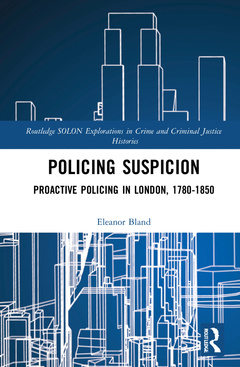Description
Policing Suspicion
Proactive Policing in London, 1780-1850
Routledge SOLON Explorations in Crime and Criminal Justice Histories Series
Author: Bland Eleanor
Language: English
Subjects for Policing Suspicion:
Keywords
Proactive Policing; Policing Agents; Police Court Reports; Young Men; Bailey Proceedings; Bow Street; Proactive Arrests; Metropolitan Police; Policing Practices; Vagrancy Legislation; Reputed Thieves; Common Language; Criminal Stereotypes; Proactive Cases; Criminal Class; Police Constables; Suspicious Persons; Repeat Offenders; Previous Offenders; Criminal Justice Administration; Westminster Parishes; Criminal Justice Reform; Bow Street Runners; Anti-social Behaviour Legislation; Bow Street Office
Publication date: 05-2023
· 15.6x23.4 cm · Paperback
Publication date: 11-2021
· 15.6x23.4 cm · Hardback
Description
/li>Contents
/li>Readership
/li>Biography
/li>
Policing Suspicion is an innovative examination of policing practices and the impact of these on patterns of arrest and prosecution in London, 1780-1850. The work establishes and defines the idea of 'proactive policing' in historical context: where police officers exercised discretion to arrest defendants on suspicion that they had recently committed, or were about to commit, an offence.
Through detailed examination of primary sources, including the Old Bailey Proceedings, newspaper reports, instructions for police officers, archival records of policing practices and Select Committee reports, the book examines the reasons given for arrests, and the characteristics of those arrested. Suggesting that individual police officers made active choices using their discretion, the book highlights how policing practices affected the received record of criminal activity. It also explores continuities and changes in policing practices before and after the establishment of the Metropolitan Police force in 1829, examining the expectations placed on the various officials responsible for law enforcement. The book contends that policing practices, and proactive officers themselves, contributed to the prevalence of criminal stereotypes. Beyond the historical, the book is situated within criminological frameworks around policing and preventive justice, noting parallels between historical policing based on suspicion and contemporary police powers such as stop and search.
Speaking to issues of wider significance for criminologists by examining interactions between the police and suspects, and reflecting on police decision making processes, the book offers an original approach to those researching both the history of crime and policing, and criminology and criminal justice more broadly.
1: Introduction; 2: Criminal Justice in London: Reform and Debate; 3: Expectations of Policing Agents; 4: Policing Agents and their Proactive Practices; 5: Proactive Policing: Reasons for Suspicion and Criminal Stereotypes; 6: Policing Repeat Offenders; 7: Conclusion; Appendix



